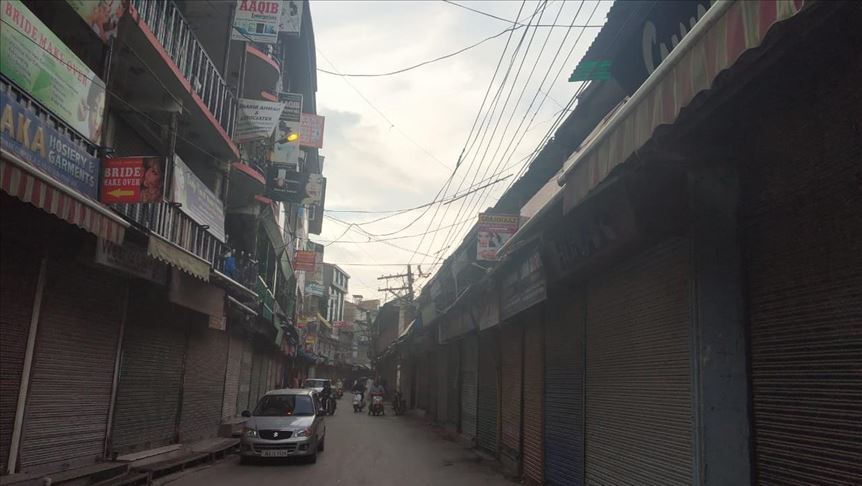'We're back to the stone age': Kashmiris
Communication blockade in Kashmir approaches 2-week mark

SRINAGAR, Jammu and Kashmir
Srinagar residents have not been able to contact their families and friends due to the Indian government's communication blockade since it revoked the special status of Jammu and Kashmir on Aug. 5.
Shuib Khalil, a resident of Srinagar, has not heard from his cousin living in the Indian capital, New Delhi.
"No phones are working anywhere in Kashmir. I have no information about my cousin. He was expected to visit home on Eid al-Adha, but he didn’t arrive, and his family is worried for him," Shuib told Anadolu Agency.
He added: "We are back to the stone age. In the 21st century, we don’t know what is happening even inside our city, let alone the other parts of the world".
Locals in the valley are angry about the Indian government's decision to scrap the special status of Jammu and Kashmir. With complete information blockade across Kashmir region and being confined to their homes without any information about their loved ones, they feel like they are being "punished", the residents said.
This is the first time a communication blockade at such a magnitude is in effect in the only Muslim-majority region.
"How can they choose our fate without consulting us? We heard about this decision when clampdown was imposed in Kashmir and all top leaders were arrested including three former chief ministers. This is not the way decisions are taken in a democracy. Even after 12 days, every person is restricted to his house," said Barjeez Ahmad, a student in Srinagar.
Abdul Khaliq, a resident of north Kashmir, said that the decision has not gone down well in the Kashmiri community.
"Nobody is happy with what has happened since the revocation of Article 370. The government is planning to change the demography of the Muslim majority state. The move facilitates this purpose," he added.
Even the leaders who have been advocating India in Kashmir are now depressed, he said and added: "What will they tell the people of Kashmir now once they are released? India has suppressed the mainstream parties with this decision and today there is no difference between separatist and mainstream leadership".
Pro-India leaders/activists under detention
Since the Indian government announced the revocation of Jammu and Kashmir's special status, hundreds of people affiliated to pro-India parties have been detained or arrested by the Indian authorities.
Two former chief ministers, Omar Abdullah and Mehbooba Mufti, have been under detention in Srinagar. Indian Parliament member from Srinagar and pro-India leader Farooq Abdullah has also been under house arrest.
Although the media has been regularly asking the authorities to provide the exact number of arrests made, no information has been provided so far.
Rohit Kansal, the spokesperson for Jammu and Kashmir government, has not provided a clear answer about the number of arrests and detentions since Aug. 5.
He told Anadolu Agency that the restrictions are gradually being eased out, adding that the situation on Thursday was peaceful.
Journalist detained
On Thursday, Indian forces detained Irfan Malik, a journalist working for local English daily the Greater Kashmir, during a midnight raid at their home in the southern Kashmir’s Pulwama district, his family members told Anadolu Agency.
"We don’t know why the army has detained him. He is currently at the local police station," said the journalist's father Mohammed Amin Malik.
During the daily media briefing on Thursday evening, the government spokesperson Kansal told the journalists that he had just heard about the detention and they were having the details checked.
Medicine stocks running low
In Srinagar, the capital city of Jammu and Kashmir, chemists say their stocks have started depleting and they are not able to order fresh stocks due to the communication blockade.
"For nearly two weeks now, we are not able to contact our distributors because no telephones are working. Our stocks have started to deplete. If the situation remains the same, we will not be able to provide medicines to the public," said Irshad Ahmad, an employee at a pharmacy in Srinagar.
"The biggest worry is the medicine supplies for serious diseases. What would people do if we are out of those supplies," he added.
Jammu and Kashmir region, home to over 12 million people, has been under complete lockdown since Aug. 4, with New Delhi's decision to cut off communication links, make arrests, and deploy heavy troops to thwart any protest against India’s move to revoke the special status of the disputed region.
Anadolu Agency website contains only a portion of the news stories offered to subscribers in the AA News Broadcasting System (HAS), and in summarized form. Please contact us for subscription options.







